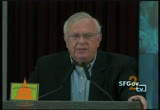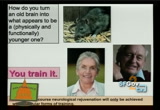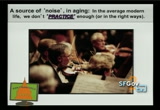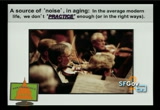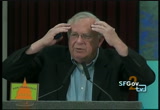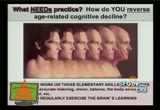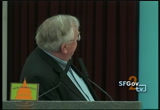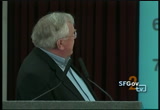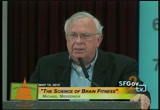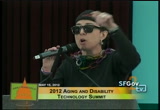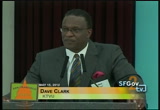tv [untitled] March 18, 2013 8:30pm-9:00pm PDT
8:30 pm
that it was a challenge to try to understand how to draw this great power, to drive brains in approving or strengthening your human benefit with a special concern about people who are beginning to be in trouble because of an impairment or disability or because something has happened to them in life, like they were merely getting older. i want to talk about that science and how we try to apply in use it to helping people in need. first of all, i want to say that there is a special thing about this plasticity as it relates to ourselves. that is to say it is constructed on the basis of moment to moment association of things that go together or the things that are expected to occur in the next moment in time. one thing that always goes with everything we feel, everything we do, every act we have had, every thought is a reference to the actor, to the player, to the doer, and that references to
8:31 pm
ourself. all of that derives massive plastic self-reference. we have to construct and enrich a strongly center itself, a person, in our brain through its changing itself in a powerful, plastic way. we're also constructed through these same processes to attach to the other people, to the other things we are close to in life. that is the basis of the attachment of the mother to the child or the child to the mother. through millions of the events of contact and interaction, all of those counts in ways that actually grow the child into the person that is the mother. we are constructed to build attachments between mother and child, between friends, across our families, and across our communities. this is something that we have to nourish, that we have to keep alive, that we have to keep healthy. we're constricted to do this in a bridge for by the way our brains are constructed, by the
8:32 pm
way we are constructed and live our lives. i want to say a special thing about plasticity but that is the son of a process -- that is that the processes in place are reversible. we have studied this, and it demonstrated this to be so. these studies begin by looking at something like an animal like a rat that might be any prime of life, upper left, and a rat that might be at the end of life, below. we know this rat is old, because he has white whiskers and white paws. so if you see a red with white paws in a garage, i'd like to say be nice to him, because he is old. of course, we're also even more interested in a younger or older adult human. what we're interested in our differences in the brain operations of the old versus the young. we have looked at this in science. we have looked at it in almost everywhere you can think of of the operational characteristics of old and young brains. what we see on average is that
8:33 pm
everything we look at is different. you could say, well, how many of those things that are different, physically, functionally, are chemically, really seem to be stronger, releasing to advantage the old brain? the answer is, none of them. alas, old is slower and less precise, less refined. old is slowly deteriorating. but there is good news in a moment, just wait for a moment. ok? [laughter] then we ask, how complex of the way we have to train the rat or how complex what we have to train the human to reverse these characteristics that define them as old? first, let me say something about being old. you could say if we're all deteriorating when we're older, why the heck do young people tolerate us? the answer is simple.
8:34 pm
something grows in this through life, and that is acknowledged. older people know things. they have lived life. that experience. not only do they have knowledge, they have manipulated that knowledge in complex ways in their brain, and the have come too intelligent conclusions about them. we call it wisdom. if you do not believe that, imagine a world war ii with britain led by a 25-year-old winston churchill. right? you need wisdom. you need wisdom. society's need wisdom and knowledge. they value older people. but operationally, functionally, you know, we slow down. we're less precise. we remember less. we're less effective than we could or should be. we asked the question of how complicated with the training be, and what did these things are reimbursable -- reversible? i will tell you, everything is reversible.
8:35 pm
everything can be improved. every dimension of the physical, functional brain can be reversed in a positive direction. it is all reversible. we're constructed to be basically reversible. so, first of all, we look at the process of the brain as it relates to the alertness of the brain. look at recovery. we look at the process as it relates to the intentional control of the bravin. we look at the accuracy as to how the brain receives information. is schematically approved by training. we can speed up the brain almost always by two to three-fold in an old animal or human not so far away from the end of life. we look at an animal and dealing with complex information occurring across time, and it has improved. we look to the processes that relate to the flexibility of the
8:36 pm
operation of the brain and their dramatically improved. we look to the processes that relate to memory or recording information in the brain. everything is approved. physically, functionally, and chemically improved. this is an asset we should use. but how can we use it? before describe that, i want to say -- you know, how do you turn an old brain that appears to be deteriorating into a physically and functioning younger one? the answer is, you train it. you have to train inappropriately. there are certain strategies that have to be applied, obviously. another question is, why does the brain deteriorate to start with? why is it is degrading? the simple answer is, you reach a peak and about the third decade in life, and then slowly, slowly noise ines begins to creep into the process of the brain.
8:37 pm
you can think of it as growing chatter in the brain. we know that because we can add noise in the brain in various ways, and in science we would not do this in a human, but we could do this in a rat. and over two or three or four weeksa four rat in the prime of life -- four weeks, the brain of the rat looks like the brain at the end of life. we see an interesting thing when we look at the detail. we open up the characteristics of the brain near the end of life if we carried this do it far enough extent so that the brain looks very much like the brain of a child, of a baby that has had literally no experience. if you think of these processes is being reversible, of course that is true. we come out of the noise, you can say, and we refine our processes and get more confident in processing information and more accuracy, and we reach a peak, and then we slowly decline
8:38 pm
back into the direction with which we came. and the culprit, what is causing this, is the growth of noise in our brain. where does the noise come from? it comes from, in part, because in the early part of our life, where continuously learning and refining. then we reach a point where we are largely operating automatically. we are largely operating on automatic pilot without thinking very much about the details of what we're doing. as an example, think of this guy sitting in the orchestra. a professional violinist. a master at controlling the fingering hand, a master listener. what happens if he stops practicing in his professional career? what he does not practice for a month? everyone around him knows it. they say, why is he if he stoppg for a year? he has probably lost his job.
8:39 pm
no one will mistaken for a professional. everyone is worried about bill. what if bill didn't practice for 10 years? he would be pretty good from our perspective, he would be bun -- a fun at parties, but no one would really mistake him for being a professional. but what if he decided like to initiate his practice and cover his career? he would improve a lot. there are many instances where people haven't played for a decade or more and recover their abilities. you don't naturally practice in receiving the language that i am delivering to you. you don't practice in the ways that are required to maintain because we don't do it
8:40 pm
instinctively. one of the reasons that it becomes noisier as we get older because we are, in a sense, not practicing enough. the reason we are here is technology. the technology is all about providing input, a life that we can live that doesn't require living life without the troublesome requirement of having much of a brain. these are wonderful things. the american citizen watches this in the upper left for about seven hours a day. that is information without action. i loved it. but in moderation. on the lower left.
8:41 pm
we see a topographic map from a satellite. what you see in red is the city of baltimore. places where the sunlight does not hit the ground because it is all paved. it is to make sure that every footfall is secure and you cannot pay a bit of attention to it. many of you have been doing it for quite a few years now. it is not good to sleepwalk through life. that way we don't have to worry about a thing. there is no bond on the floor. it is designed to be controlled and removed our brains of for having to worry about the details. i use google for an hour or two or three every day and my work and in my life.
8:42 pm
what a wonderful tool. it reduces exercise in thought through the momentary process of looking up information. we don't have to know where we are anymore. we can have someone tell us exactly where we are in the world. and we are also adding noise by the way we live our lives. we can compensate by trading in our brains in recovery direction and we can use technology to do that. how do you reverse age-related cognitive decline? you have to work on the skills and abilities that support accurate vision, balance, and body. you also have to exercise the
8:43 pm
brains learning machine. if it is slowly dying off. this is really important. it is about reestablishing your ability to operate in the world with all of its gloria's details. we accomplished that in part, or we a help accomplish that by constructing computer-based exorcises that use these basic strategies to try to drive these changes and integrate them with high efficiency. these exercises that are available and computers for you to look at today provide the easiest and the most efficient way to get this tell -- this helps. all the time you spend in training is useful. everyone can operate successfully or effectively with
8:44 pm
that and they can go as far as it can. it is optimized for rate improvement, you get the most bang for your buck. it is expensive because there is a lot to fix, or you can say a lot to strengthen. you have to get to a lot that relate to receive information. and using it can thought. it is important that the outcome or the benefits of this be confirmed. it is like a gold standard trial the confirm that you do receive the benefit of the program is designed to deliver. everybody doesn't have an equal benefit, the brain is too complex for this.
8:45 pm
even find that information, and you can also find information for those of you coming to the workshop that my daughter and i are doing this afternoon. it will also provided information on computers here at that meeting. what do we know from the science? you can see the scientific references and see where the studies were done at different research universities, the mayo clinic, harvard, and other places to see what the confirmation is all about. we can see that it improves the basics. , u r her rider, your engagement
8:46 pm
is stronger. every improvement translates to about 14 years on the average. after they are trained, the improvement would give them the memory level of an average person of about 56. we see faster and sharper thinking and acting. almost everything you do that involves making a decision about what you have seen or heard or acting in a complex behavior. this is certainly important from the point of view of for your sustaining independence. this is kind of interesting thing, right? people see things so much better
8:47 pm
that they have about half as many driving accidents, it makes a big difference in the safety of driving and also walking. we have seen improvements in health. the person spends about $300 less a year in health-care costs, that is because the brain training confers benefits and also to physical health from the body. we see sustained independence that is critical. they have been confirmed in the scientific experiments in a carefully validated way. remember, these are statistical arguments. some people benefit more, some people that if it lasts. o as i understand that. what else should i be doing? this is a very long last and
8:48 pm
this is very small writing. who would make a list like this? first of all, it is important that true life, you continue to acquire new skills and abilities. you continue learning, and in a sense, it can be anything. take up the harmonica, develop better expertise in another language. take a learning seriously. seeking new avengers and experiences. how the brain loves it ventures. in love the challenge of the unexpected problem. they can run into trouble, the brain love that and feeds on that. reconnect with the real world, smell of flour. get out there and live life to
8:49 pm
get as if you were a kid. enjoy it in all of its details. scheduled daily social exercise, some people can't get out. the people. skype them. you don't even have to be outside, but daily social exercise is critical. we are social beings and creatures. whenever you give something to someone in an act of kindness, you get just as much reward in your brain and just as much exercise as when you feel it when somebody does something for you. it is healthy to do that. how about a serious approach to new learning. the brain is smart enough to not change a thing. be serious about changing your
8:50 pm
brain for the better. and if you can, take a hike, take a walk. go on a bike for 20 or 30 minutes every day. connect yourself with the world. smell it, look at it, check it out. shake hands with it. you will enjoy every moment of it, and your brain will enjoy it. you have the power, you have been given this great gift by the creator of the universe or by mother nature or some combination thereof. to change your life for the better, to be better than you are today. use this resource. work to improve yourself because
8:51 pm
you will have a happier life in the end. will see it on one of my morning walks or bike rides. thank you very much. >> my goodness, what a rich a day. we can all have hope and not be fearful about anything. we take that attitude that we can reverse things. haute not going to tell them what my next birthday is going to be. she was born in 1932.
8:52 pm
one woman looked up at me and says, dear? she found out it was ok. we can all have the ability to do whatever we want to do. when she is not wrapping -- rapping, she is the co-director on the center for elder abuse and neglect, the university of california, irvine. a program called the institute of aging to 2007, i am proud to serve on that board. from catholic university in
8:53 pm
washington, who is started with the first song. there is no excuse for elder abuse. >> i am very happy to be here to talk to you all a little bit about elder abuse. there is about 5 million people. ♪ a little louder. you want me to rap? ♪ i need some help. my brain elasticity is not too god. i -- good.
8:54 pm
i need your help. turn to page 21. yo, yo, yo. maybe you want to stand up a little bit, get the blood running. 21 little -- ok. listen up. join me if you can. ♪ i want to stay connected there's a big world out ther e email through the air i may be over 60, but i love mp3's face time me ♪ here we go. one, two -- ♪ is urf the -- i surf the net for free my favorite cafe is the library i write to all my homies
8:55 pm
they know the adresdressee i'm great with advocacy ♪ we have to use the internet for advocacy and democracy. we have to be savvy cyber users. ♪ an e-mail from nigeria says i won $1 million a check will come, made out just for me ♪ ♪ what do i do? press delete looks to good to be true, it is ♪ go to verse one, say "we." ♪ we want to stay connected
8:56 pm
there is a big world out there email flying through the air i may be over 60, but i love those mp3's face time us ♪ you'll be googling us later. stay safe out there in the internet world. take care. yo yo. [applause] >> we will get started. for the second half of our mourning, as you know, the lead davis joined us this morning, and we have dave clark joining us for the next half. dave has been an award winning newsmen for 35 years. he has been broadcasting for 35 years. he started when he was 17, so i have not had a chance to ask him
8:57 pm
what that special experience might have been about, but maybe you'll get a chance to ask him about this. i was interested in reading about all the places that he has worked. he has ben in new york city, washington d.c., he has been in los angeles. probably the most interesting for me was the fact that he was in philadelphia for a number of years. we know in the department of aging and adult services that philadelphia has one of the most interesting and creative network of services for older adults in the country. it is really accessible to older adults. some of the most creative work we have seen at around the country.
8:58 pm
dave is also on the board of several civic organizations including the challengers boys and girls club, and cure autism now. edave -- dave, take it away. >> and good morning, can you hear me? in the back, can you hear me? i can see you. good morning, and thank you very much. if no one told you this morning, you look good today. you really do look good. in fact, you look just like i thought you would look on tv.
8:59 pm
i thank god for the opportunity to be with you for this very important conference. this is big. this is important. one of the things that she did not tell you about me that a lot of people don't know, not that you have to care, i have a signed with a disability. my youngest child, i have three children. my oldest is 30 and i have a 22 and 19-year-old. my only son has had spent his life in and out of intensive care. he has a seizure disorder, and he is the greatest young man in the world. i am saying this as a point of i am saying this as a point of contact.
47 Views
IN COLLECTIONS
SFGTV2: San Francisco Government Television Television Archive
Television Archive  Television Archive News Search Service
Television Archive News Search Service 
Uploaded by TV Archive on

 Live Music Archive
Live Music Archive Librivox Free Audio
Librivox Free Audio Metropolitan Museum
Metropolitan Museum Cleveland Museum of Art
Cleveland Museum of Art Internet Arcade
Internet Arcade Console Living Room
Console Living Room Books to Borrow
Books to Borrow Open Library
Open Library TV News
TV News Understanding 9/11
Understanding 9/11